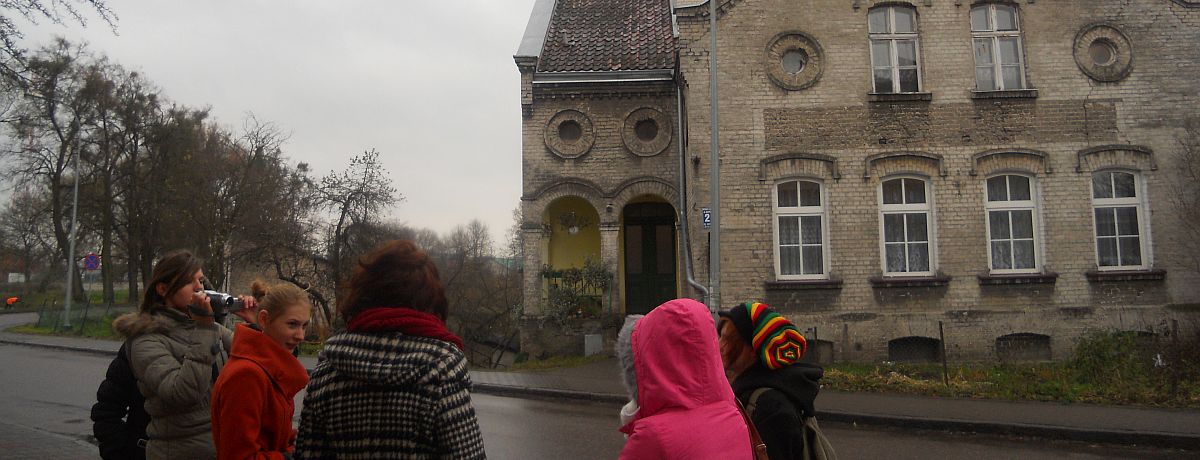| 2012 |
Orneta
29th Aviation Regiment Junior High School No 2


| 2012 |
So where in fact was the synagogue? Or maybe there were two? Students from the junior high school in Orneta wanted to tackle these and other questions. Access to information on the history of the Jewish community was quite limited in this little town in Warmia Province but students were determined to establish the truth about the former location of the synagogue. Did they manage? Orneta has been a multicultural town for ages – there is a Greek Catholic church and an Orthodox church which before the World War II housed an Evangelical church. The Jewish Community in Orneta established in 1800 was one of the first in Warmia Province. The largest number of Jews, approx. 4%, lived in Orneta in the 1890s. Before the World War II, only around 45 Jews lived here. Today, Jewish heritage in Orneta seems abandoned and not cherished, even though one of the primary schools is named after Janusz Korczak and one of the sponsor’s of the school’s flag was the Jewish Socio-Cultural Association in Poland.
Students centered their activities around a walking tour of Orneta, prepared in two options: one for elementary school students and the other one for adults. To the other tour they invited their parents, as well as representatives of local authorities and Town-Village Association dealing with local history, as well as representatives of local clergy.
Students placed a great emphasis on diversification of the tour for its youngest participants, i.e. students from elementary schools could expect specifically crafted tasks helping them to assimilate information they were introduced to.
The walking tour included several locations of the synagogue, as it was indicated in different sources i.e. in Zamkowa, Rozjazdowa and Kopernika Streets. The majority of the sources point Zamkowa Street as the location, however it is also indicated that the building at 24, Mikołaja Kopernika served for prayers or meetings of Masonic Lodge (in this case the establishment date was 1849). The synagogue in Zamkowa Street was built in 1890, after the War it was changed into a residential building. Next, the walking tour took the participants to the building of the cheder and kosher kitchen (where there is a bookshop now), and to the cemetery.
Students also staged small performances at different stops that added variety to the tour: one of the classrooms in school was decorated as a pre-war apartment, and a slide-show was projected there, showing photographs of the life in Orneta long time ago. It actually enriched the story about the role of women, about holidays and former everyday life.

The website of the Town Hall was very helpful as it contains a gallery of old photographs of Orneta. The participants were most impressed with a visit to the building of the former prayer house.
Staging performances presenting everyday life of the Jewish community turned out to be a perfect way to present Jewish past to the youngest tour participants, as well as going through old photographs, or thematic games, plays and crossroads. All participants could also taste donuts while listening to stories and discovering Hanukkah traditions.
Students also tackled the important issue of anti-Semitism, and in particular Kristallnacht, as the events related to it also occurred in Orneta (then a German town), when the synagogue and the Torah scroll were destroyed. After anti-Semitic rallies in 1938, some Jews emigrated to Berlin and Konigsberg, and also to the Netherlands and France. Those who stayed, were moved to ghettos in other towns, e.g. to a ghetto in a home for the elderly in Olsztyn. The descendants of the survivors now live in the Netherlands and Israel.
During the walking tour attended by members of the local authorities, young people talked about difficult moments of the past, but they also raised the issue of negligence on the part of the town regarding the Jewish cemetery where only around a dozen of matzevot survived, and part of its area serves today as a pasture. The group was very proud of the work they had done. Because the school principal contacted the representatives of the pre-war Jewish community of Orneta, students were able to determine the exact location of the synagogue in the town. They now say that this project allowed them to meet interesting people, integrate during work and learn how to prepare visual materials, such as photos, films and presentations.
“I learned a lot about my town”, concluded one of the participants. “It was very interesting as I had never heard of traces of the Jewish community in Orneta”. Another participant added with honesty: “Well, I used to associate Jews only with jokes, today I know much more about them and I will do my best to pass this knowledge if only there is someone willing to listen to me.”
We discovered many places in Orneta that belonged to the Jewish community. The information we collected about it was surprising and interesting. You’re probably aware that today’s youth would do anything to skip a class, but after the program it is clear how involved in the subject we all became. A lot of the traditions we discussed will surely stay with us.
Aga, workshops participant
… now I am familiar with the rules of kosher eating, Jewish holidays, Jewish calendar and many other fascinating things. Most importantly, I found out that we have a Jewish cemetery and a synagogue in our town! I encourage you to get to know the history of your hometown – it will surprise you!
Andrzej, workshops participant

School:
29th Aviation Regiment Junior High School No 2
Students:
3rd year students
Teacher:
Dorota Badyła
Educators:
Katarzyna Czajkowska-Łukasiewicz, Katarzyna Niewczas
School of Dialogue program in Orneta was made possible by the support from ROBERT BANK.
In appreciation to the Conference on Jewish Material Claims Against Germany (Claims Conference) for supporting this educational program. Through recovering the assets of the victims of the Holocaust, the Claims Conference enables organizations around the world to provide education about the Shoah and to preserve the memory of those who perished.

In appreciation to Friends of the Forum for supporting the School of Dialogue educational program.
